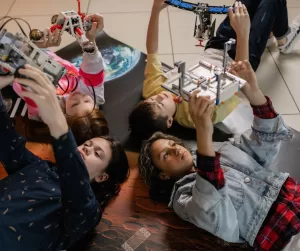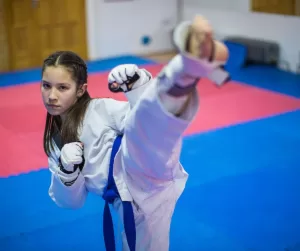Why DO kids lie? It’s pretty straightforward but anything but obvious. Here’s the break down on why kids lie and what you can do about it.
 Q. My eight-year-old daughter has taken to lying and I don’t know what to do. The other day I was driving her home from a friend’s house. I looked in the rear-view mirror and saw her playing with legos that were not hers. Her friend has quite a collection. I asked her where she got them, and she told me that a friend at school had given them to her. I said that we had not brought them to her friend’s. She said she had put them in the car earlier to play with on the way home. Her brother told me later that she had taken them from her friend’s house. What is my next step?
Q. My eight-year-old daughter has taken to lying and I don’t know what to do. The other day I was driving her home from a friend’s house. I looked in the rear-view mirror and saw her playing with legos that were not hers. Her friend has quite a collection. I asked her where she got them, and she told me that a friend at school had given them to her. I said that we had not brought them to her friend’s. She said she had put them in the car earlier to play with on the way home. Her brother told me later that she had taken them from her friend’s house. What is my next step?
A. Let’s start with understanding how badly she wanted the legos. To influence her with the right way of handling the situation, you will make better progress by connecting with her first. Try:
“I see you have some legos that don’t belong to us. It looks like you really wish they were yours. I know Sarah has quite a collection doesn’t she? I bet you wish you had that many.”
At this point you are more likely to get her to acknowledge that she does want her friend’s legos. She may complain that she doesn’t have enough. If she says, “You’d say no” to you suggesting she ask you, you need to again connect with, “So you thought that taking some from Sarah would be the only way you could get more.” She will probably feel heard and say yes.
Then I would suggest that you put your trust in her rather than withdraw it. “I know you know it’s not okay to take things from anyone that doesn’t belong to you. That’s why you had a hard time telling me the truth. You knew you’d done something wrong and didn’t want to get in trouble. You must have felt a little scared. I’m sure you wouldn’t like it if Sarah took something of yours.”
After all this you may get some tears but at least some remorse. You are not accusing her. Instead you are understanding the process she went through and trusting that she knew it was wrong. When you accuse with, “Why did you lie to me?” or “You can’t steal things from others. It’s not right”, she will feel blamed and go into defense mode. This is how we teach our children to lie.
Why Kids Lie:
- To protect themselves from getting in trouble
- To avoid your disappointment or disapproval
- To gain power or impress others from a place of insecurity
- To get what they want when they fear they can’t have it
 In other words, defense mechanism always plays a role in why kids lie. If you accuse your child, you will give them more reason to be defensive. When you understand their motives, they are more likely to listen and come around to a solution.
In other words, defense mechanism always plays a role in why kids lie. If you accuse your child, you will give them more reason to be defensive. When you understand their motives, they are more likely to listen and come around to a solution.
When kids begin to fabricate the truth, it’s easy to lead them back in the right direction when you acknowledge what they were after—and normalize it. But if you think that their “lies” are the slippery slope to criminal actions, then your fear will lead you to accuse and blame, which will push them further away from your influence.
When your child believes you don’t trust him, there is no reason for him to behave in a trustworthy manner. But if you instill your trust by understanding his motive, by acknowledging how bad it must have felt and by working through a solution together, your child will feel your trust, not want to betray it, and no longer feel the need to lie.
 Once connection is made, you can say to your daughter, “It’s important to get these lego pieces back to Sarah. Shall we take them back this afternoon or tomorrow? Would you like to do it yourself while I wait in the car or would you like me to go with you?” You can bet she’s feeling powerless at this point. Offering a choice gives her a chance to gain some back.
Once connection is made, you can say to your daughter, “It’s important to get these lego pieces back to Sarah. Shall we take them back this afternoon or tomorrow? Would you like to do it yourself while I wait in the car or would you like me to go with you?” You can bet she’s feeling powerless at this point. Offering a choice gives her a chance to gain some back.
Notice I never used the word “lie” in any of my dialogue.
How to Handle Lying:
-
- Take the word “lie” out of your vocabulary. Use fabricating the truth or not telling the whole story.
- Understand that the lie is motivated by self-protection (ask yourself what is my child protecting herself from?) or fear or insecurity (what is she afraid of?) Then look at your part and ask if there’s anything you want to change. For instance if she fears punishment, losing her phone, etc. you might want to rethink the effect of punishment on her.
- Remember your child is having a problem, not being a problem.
- Remain objective. This is a problem your child is having. Don’t take it personally. You can help with the problem but don’t try to fix it.
- Build trust instead of tearing it down. That doesn’t sound like the whole story. I wonder if you’re afraid of telling me what happened because you’re worried I’ll be upset. I can understand wanting to hide some of the facts. But I don’t want you to feel awful about not being honest with me. I know how bad that can feel.
- Set expectations for success. Why don’t I come back in a few minutes, and you can have another chance to tell me the story. I promise I will listen calmly, and together we can work out a solution.
- Ignore the lie but tend to the motivation.
- Do not punish. Use problem solving instead.
- Think of lying as a mistake, not a crime.
When it comes to why kids lie, and parenting in general, our modeling is the best teacher:
- Model honesty.
- Take responsibility always for your words and actions.
- Don’t blame or accuse.
- Never use fear to motivate good behavior (punishment).
- Give your child the opportunity to make amends.
There is never a need to lie when you know you can talk to your parents and trust they will understand—even when the mistake is huge.
Related Articles:
He’s an Integrity Kid, Not a Habitual Liar
For more insight on confident, connected parenting, listen to “Confident Parents, Remarkable Kids” on Audible.







